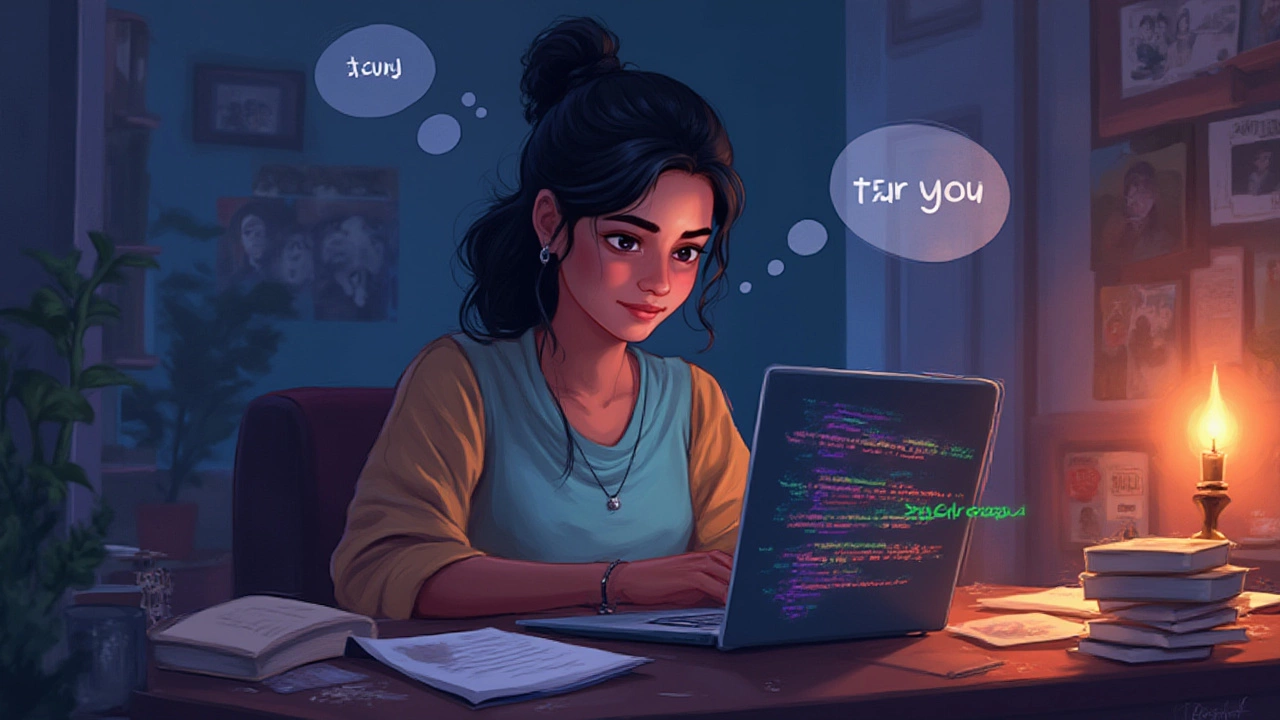Python keeps showing up everywhere you look—on lists of the most popular programming languages, in job ads, and in stories about teens building their first apps. But is Python actually easy to learn for someone with zero coding experience? You probably hear, "Python is beginner-friendly!" so often that it starts to sound suspicious. So, what’s the truth? And what does it really take to go from confused to confident with this language?
Why Python Feels Different From Other Languages
You know how most programming languages look like weird math mixed with alien code and punctuation marks everywhere? Python is like a cool friend who explains complicated stuff without making you feel dumb. Its design actually emphasizes readability and simplicity. Think about writing: "print('Hello, world!')" to get your first output on screen. That’s pretty clear—you’re just asking Python to print something.
The creator of Python, Guido van Rossum, designed the language to feel human-readable. It actually borrows concepts from plain English. Lines end where your sentence ends. Indentation matters more than curly braces, so there are fewer mystery symbols to trip you up. Other languages sometimes turn a simple task into a puzzle. In Python, you just describe what you want to do.
Statistics love Python, too. According to the TIOBE index, Python climbed to the #1 spot for programming language popularity by 2024. Why? Companies like Google, Netflix, and Instagram use Python behind the scenes. And it keeps making its way into schools and coding bootcamps, because teachers find it much easier to explain coding basics with Python than with Java or C++.
One surprising fact: some research out of MIT showed that students with no coding background grasped programming concepts about 40% faster when they started with Python over other languages. Less time decoding symbols means more time actually thinking about logic.
But there’s a flip side (there always is!). Python doesn’t actually hide complexity from you—it just helps you avoid it at the beginning. As your code gets more ambitious, you’ll bump into things like version management, weird errors, and the infamous "indentation error" (when you miss a space or a tab). Yet, those are common growing pains all coders face, and Python’s errors are usually easy to read—sometimes hilariously polite: “Did you forget to indent?”
If you’ve tried to learn something like C or JavaScript before and felt lost, don’t panic. Python gives you smoother on-ramps. But it’s not magic. It won’t do your homework for you. You still need to learn logic, understand concepts like loops and variables, and break big problems into bite-size steps.

Steps to Actually Learn Python (Without Giving Up in Week 1)
Getting started with Python can feel like jumping into a pool—exciting, refreshing, and a little bit cold at first. But thousands of people get through their first weeks, and you can too. Here’s how you can make your Python journey smoother from the get-go.
is python easy to learn? Well, only if you give yourself the right tools and time. Grab a free and reputable resource—websites like Codecademy, Coursera, or even Python’s own tutorials are solid. They offer all the basics, and many let you test code right in your browser, so you don’t need to set up anything complicated at first. Try typing out examples, not just reading them. Muscle memory matters: the more you type, the more natural it feels.
Not everything about Python is instant, though. Most people get tripped up on data types, list handling, and error messages. When that happens, Google is your friend. Seriously, pro developers Google stuff all the time. No one memorizes every command.
Want to stay motivated? Try building something tiny but useful for yourself. Automate sorting a list of your favorite songs. Or write a little script that reminds you to stand up every hour. Quick wins spark confidence and curiosity.
Set a tiny goal for every practice session. Maybe today, just focus on understanding how "if" statements work. Tomorrow, try working with lists. Next week, mix them together. Avoid skipping ahead until you’re comfortable. It’s tempting to rush and skim, but that almost always leads to frustration later.
And join a community. Reddit’s r/learnpython is packed with beginners and pros who genuinely enjoy helping each other. Stack Overflow and GitHub are goldmines for code snippets and bug fixes. You’ll quickly realize everyone struggles, even the experts.
If numbers help you make decisions, here’s an encouraging stat: according to Stack Overflow’s 2024 Developer Survey, more than 40% of users working with Python had less than two years of experience. That means you’re never the only beginner in the room.
Let’s bust one myth: you don’t need advanced math to learn most of Python. Sure, if you want to dive into AI, robotics, or finance, math eventually comes in. But for basic scripting, automation, web scraping, or text analysis, you mostly deal with counting and simple logic.
All learning takes practice and some frustration, but Python removes a lot of the unnecessary headaches. The platform is forgiving, the documentation is friendly, and most errors actually describe what went wrong, not just "Segmentation fault." The trick is pacing yourself and loving the little breakthroughs.

Tips, Tools, and How to Keep Improving With Python
Learning Python doesn’t end with the first "Hello, World!" Sticking with it past the first month is about curiosity, community, and picking the right projects.
As you move from rookie to regular, level up your coding setup. Practice at first in online editors, but as you get serious, install Python on your computer (Windows, Mac, Linux—it runs everywhere). Try working with Visual Studio Code, a free editor that makes writing and debugging easier. There are tons of free extensions that highlight your errors, suggest fixes, and even make your code look pretty.
Get used to reading actual code written by others. GitHub has millions of Python projects—find something interesting and browse the files. Don’t worry if you don’t understand everything. The more you see, the more patterns you’ll notice. Try to tweak a script, see what breaks, fix it again. It’s hands-on, messy, and the fastest way to learn.
If you get stuck (you will!), use the documentation. Python’s official docs are written in simple language and have plenty of code samples. Searching is easy and rarely requires sifting through mountains of jargon.
Many Python beginners run into confusion about packages and libraries. Want to chart data or work with web pages? Instead of building everything yourself, you can "import" a package that does the heavy lifting. To manage these, use pip, Python’s package installer. For example, if you want to make a graph, just install the famous Matplotlib library:
- Type this in your terminal: pip install matplotlib
- In your Python file, write: import matplotlib.pyplot as plt
- Follow a tutorial to create your first chart. Instant win!
The chart below shows some of Python’s most popular libraries and why people love them:
| Library | Main Use | Popularity (Downloads in 2024) |
|---|---|---|
| NumPy | Math & Science | >120 million |
| Pandas | Data Analysis | >90 million |
| Matplotlib | Charting | >80 million |
| Requests | Web Requests | >70 million |
| Flask | Web Apps/API | >40 million |
There’s one more thing people often overlook: Python isn’t a destination, it’s a springboard. Once you’re comfortable, try building a game with pygame, scraping a website, or training a tiny chatbot. The key is momentum. Each new project reveals a new trick—and you’ll stumble way less the next time.
Some tips to remember:
- Code every day if you can, even 10 minutes. Habit matters more than marathon sessions.
- Ask dumb questions without shame. Even pros remember their first "oops" moments.
- Find a challenge, like Advent of Code or Python Weekly, to push your brain outside its comfort zone.
- Return to earlier projects and rewrite them. You’ll be shocked by how much cleaner your code becomes.
- Make your learning social. Teach a friend, or write a post about solving a problem. Explaining reinforces skill.
- Bookmark cheat sheets, such as https://www.pythoncheatsheet.org, for quick reminders rather than rote memorization.
Is Python easy to learn? It’s as close as it gets in the coding world. It removes a lot of friction and makes errors far more forgiving. All you need is patience, good resources, and a playful mindset. You won’t just learn to code—you’ll learn to solve problems, automate life’s annoyances, and maybe even land yourself a cool job down the line. Python welcomes you in, and who knows where you’ll end up after your first "print('Hello, World!')"?
